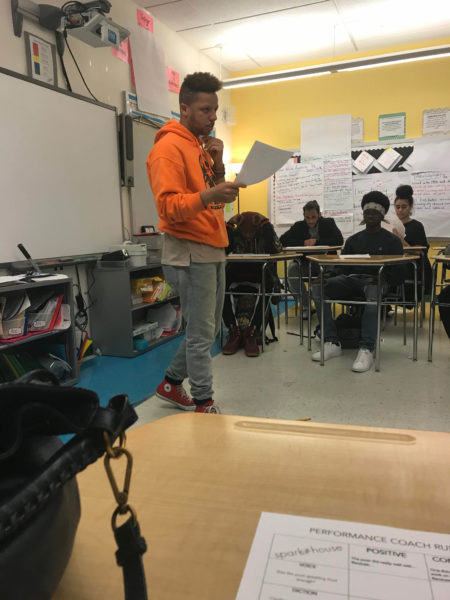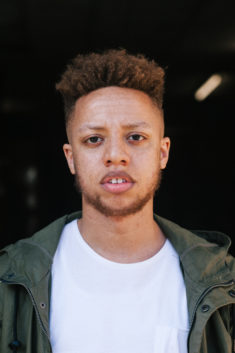Through the generous support of Poets & Writers, The Center for the Humanities, at the Graduate Center, CUNY was able to add another chapter to our ongoing work of fostering meaningful connection with organizations in our surrounding community. Our collaborations with Alex Cuff have steadily branched into a series of workshops and panels, hosted by Raven Press, a publishing collective based out of the Academy for Young Writers.
This spring, we invited Najee Omar--a teaching artist who works to turn classrooms into stages through his poetry and performance workshops--to meet twice with students at the Academy for Young Writers. He introduced them to the performative side of poetry and gave them insight on how vast and accessible that world is. Below are reflections on the workshops by Omar and student Sabine Francis.
Najee Omar
April 19th Reflections
Today, the youth at Academy for Young Writers reminded me of the word bravery.
As an extension of Sankofa, the theme they've been discussing all unit long, we looked into the idea of legacy. It's important to me, that black and brown faces, especially our youth, meditate on their legacies -- those inherited and what they wish to leave behind. It is important that we encourage our youth to envision and think of themselves in the future, and to recognize that the future belongs to them and their descendants (if they so choose).
And what better way to do this than through poetry. Carvens Lissaint's “Tell Them” served as the perfect vehicle into this conversation. Students annotated, dug deep, and picked words and phrases that resonated with them. From there they broke into a writing session in which they explored what would be said about them in one hundred...two hundred years from now.
When I say brave, what I mean is honest. Endearing. Transparent. Students poured their hearts out about their fears, their dreams, their quirks, and every infinite detail that makes them who they are. They were bold about how they wanted to be remembered. And it was a pure joy to turn the power back over to them and give them the tools to be in control of their own narratives.
The youth at Academy for Young Writers are brilliant, and Alex has created such a warm and welcoming space for them. It was a pleasure to be in conversation with them on this day, and looking forward to following up next week.
Sabine Francis
Reflections on April 19th workshop
April 24, 2018
When I first saw Najee, I could tell that he would be a very loud and entertaining person. I could tell from the clothes he wore to the expressions on his face. I really liked the starting activity with the hand and writing about what we were given and what we want to give. It’s something different that will most likely be used in the future. Something that will stick with me from this workshop is the poem that we focused on and then wrote one just like it. Writing that poem made me think of how I want people to see me. I really enjoyed his visit and I recommend that he visits in the near future.
Below is an unfinished piece of the poem I wrote:
In my last days
Before being buried six feet under
Remember how positive I was
How I supported the people surrounding me
How I asked “What’s wrong?”
Tell them I was not only an angel
But a demon too
Tell them I had my days
Where I was down and only sleeping
Would make me feel better
Tell them of the days when I wasn’t so positive
When I pushed people away
How I said things I didn’t mean
Tell them about when I bounced back
How happy I was
A ray of sunshine
Tell them of the time I wasn’t innocent anymore
When the world exposed me...
Najee Omar
April 26th Reflections
The word for today is: texture.
In an extension of last week's workshop, Alex, the resident poet and classroom facilitator at AFYW, thought it would be best to get young people on their feet in preparation for tomorrow's open mic. I decided to lead a workshop that invited voice and sound into the room.
We opened with a vocal warm up. A combination of words that accompanied its own rhythm and rhyme scheme. A poem, perhaps. Through this exercise, students engaged in a brief reflection about the power of voice, sound, and diction. How words fall on the tongue and travel to the ear. We talked about the importance of reading/sharing/performing the poem. And how intentional we need to be with word choice and the tools we use to accentuate the words written on the page.
After this vocal warm-up, students broke into pairs and read work to one another. From there, they gave feedback to one another on delivery. I noticed that the room was full of a buzzing excitement, and still there was a steady focus.
We closed out with students sharing work. A panel of judges sat on the opposite end of the room and offered feedback that was poignant and encouraging. And I couldn't help but think about the ways in which poetry has taken so many different shapes and forms, in this very room, at this very moment. Some students had written prose blocks, others used devices like anaphora or refrain to drive points home. Some played with enjambment and others took on list poems. However they chose to express themselves in that moment, what was evident was that the room was full of texture. Each student began to come closer and closer to their own, unique voice. And they got to see poetry as a place that welcomed and embraced all that they were and will be.
I left charged. Excited that through this program we could give students more tools to express themselves and find a space for their voice to stretch. My hope, moving forward, is that it echoes.

